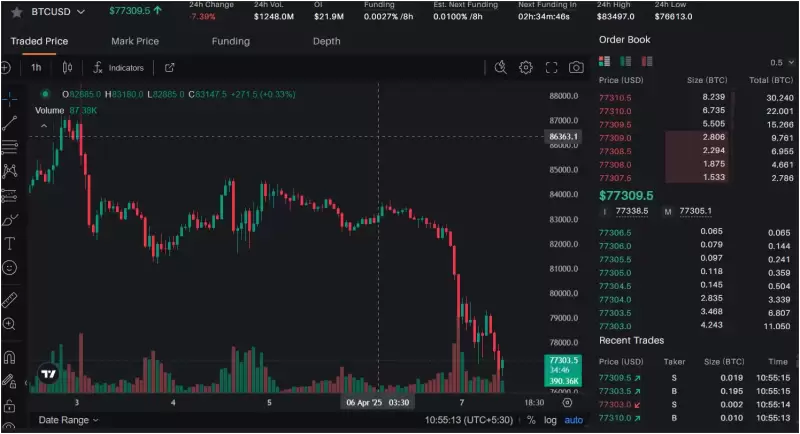 |
|
 |
|
 |
|
 |
|
 |
|
 |
|
 |
|
 |
|
 |
|
 |
|
 |
|
 |
|
 |
|
 |
|
 |
|
世界経済が貿易紛争と格闘するにつれて、暗号市場は価格のボラティリティ、採掘の混乱、規制上の課題の形で波及効果に直面しています

Bitcoin (BTC) price tumbled over the weekend, sinking well below the $100K mark as markets reacted to the latest escalation in the U.S. trade disputes. The broader digital asset market followed suit, leading to one of the most significant sell-offs since the outbreak of Covid and the collapse of FTX.
ビットコイン(BTC)の価格は週末に下落し、市場が米国の貿易紛争における最新のエスカレーションに反応したため、10万ドルのマークを大きく下回りました。より広範なデジタル資産市場は訴訟に続き、Covidの発生とFTXの崩壊以来、最も重要な売却の1つになりました。
Specifically, President Donald Trump announced sweeping new tariffs of 25% on imports from Canada and Mexico and 10% on Chinese goods. Canada and Mexico initially retaliated but have since reached deals to delay the imposition of U.S. tariffs, while China has announced its own tariffs against U.S. goods. The developments have increased global economic uncertainty and sent risk assets into a temporary free fall.
具体的には、ドナルド・トランプ大統領は、カナダとメキシコからの輸入に対する25%の新しい関税と中国製品の10%を掃引することを発表しました。カナダとメキシコは当初報復しましたが、それ以来、米国の関税の賦課を遅らせる取引に達しましたが、中国は米国の商品に対する独自の関税を発表しました。この開発により、世界的な経済的不確実性が高まり、リスク資産が一時的な自由落下に送られました。
As global economies wrestle with trade disputes, crypto markets face ripple effects in the form of price volatility, mining disruptions and regulatory challenges. But could these tensions also fuel the rise of decentralized finance? Let’s explore how tariff wars could shape the future of crypto.
世界経済が貿易紛争と格闘するにつれて、暗号市場は価格の変動、採掘の混乱、規制上の課題の形で波及効果に直面しています。しかし、これらの緊張は分散型財務の台頭を促進することもできますか?関税戦争が暗号の未来をどのように形成できるかを探りましょう。
BTC’s reaction to tariff announcement
関税発表に対するBTCの反応
President Trump announced sweeping new tariffs of 25% on imports from Canada and Mexico and 10% on Chinese goods. Markets reacted strongly to the news, with the Dow Jones Industrial Average futures dropping 400 points. The S&P 500 and Nasdaq 100 futures also fell.
トランプ大統領は、カナダとメキシコからの輸入に対する25%の新しい関税、中国製品の10%を発表しました。市場はニュースに強く反応し、ダウ・ジョーンズの工業平均先物は400ポイント減少しました。 S&P 500およびNasdaq 100先物も落ちました。
Bitcoin price initially rose about $1,000 following the tariff announcement but quickly reversed course, falling below the $98K level. The cryptocurrency sank as much as 5% during the sell-off, which also saw ether drop below $2,200 and XRP trade down to $0.50.
ビットコインの価格は当初、関税発表の後に約1,000ドル上昇しましたが、コースを迅速に逆転させ、98,000ドルのレベルを下回りました。暗号通貨は売却中に5%も沈み、エーテルは2,200ドルを下回り、XRPは0.50ドルに低下しました。
The sell-off in the crypto market was largely driven by the sell-off in global markets. However, crypto also faced its own unique challenges due to the tariffs.
暗号市場での売却は、主にグローバル市場での売却によって推進されていました。しかし、Cryptoは関税のために独自の課題にも直面しました。
For instance, a 25% tariff on electronic components, semiconductors and mining rigs would drive up production costs and reduce profitability for crypto miners. Additionally, increased expenses could push smaller miners out of the market.
たとえば、電子コンポーネント、半導体、鉱業リグに25%の関税が発生すると、生産コストが高まり、暗号鉱夫の収益性が低下します。さらに、費用の増加は、より小さな鉱山労働者を市場から追い出す可能性があります。
Furthermore, increased scrutiny of international crypto transactions, exchanges and cross-border payments could lead to stricter compliance requirements. This, in turn, could slow adoption rates and make crypto less accessible, particularly in regions where trade restrictions are tightening.
さらに、国際的な暗号取引、交換、および国境を越えた支払いの精査の強化は、より厳しいコンプライアンス要件につながる可能性があります。これにより、特に貿易の制限が厳しくなっている地域では、採用率が遅くなり、暗号化のアクセスが低下する可能性があります。
At the same time, heightened regulations may push some users deeper into decentralized finance (DeFi) platforms, which operate outside traditional banking systems.
同時に、高度な規制により、一部のユーザーが、従来の銀行システムの外で動作する分散型ファイナンス(DEFI)プラットフォームに深く入り込む可能性があります。
Shift towards decentralized finance (DeFi)
分散財務(DEFI)へのシフト
As trade conflicts heighten distrust in traditional financial systems, decentralized finance (DeFi) may offer users a way to bypass some of the barriers imposed by tariffs and regulations.
貿易紛争が従来の金融システムで不信感を高めるにつれて、分散型金融(DEFI)は、関税と規制によって課される障壁の一部をバイパスする方法をユーザーに提供する可能性があります。
More users may turn to DeFi platforms for financial autonomy. DeFi applications allow for peer-to-peer transactions without intermediaries, reducing reliance on traditional banking, which is often impacted by trade policies.
より多くのユーザーが、金融の自律性のためにDefiプラットフォームに頼ることができます。 Defiアプリケーションでは、仲介者なしでピアツーピアトランザクションが可能になり、従来の銀行への依存が減少しますが、これはしばしば貿易政策の影響を受けます。
If tariff wars continue to disrupt traditional trade channels, crypto-based financial solutions could see increased adoption.
関税戦争が従来の貿易チャネルを混乱させ続けた場合、暗号ベースの金融ソリューションは採用の増加を見ることができます。
Conclusion
結論
While crypto is often seen as a hedge against economic instability, it is not fully immune to the effects of tariff wars. From increased volatility and mining costs, to regulatory shifts and the potential rise of DeFi, the trade conflicts of today could shape the digital economy of tomorrow.
暗号はしばしば経済的不安定性に対するヘッジと見なされていますが、関税戦争の影響に対して完全に免疫はありません。ボラティリティと鉱業コストの増加から、規制の変化、defiの潜在的な増加まで、今日の貿易紛争は明日のデジタル経済を形作る可能性があります。
Investors, miners and policymakers should keep a close eye on trade developments as they navigate the complex relationship between geopolitics and digital assets.
投資家、鉱山労働者、政策立案者は、地政学とデジタル資産の複雑な関係をナビゲートする際に、貿易開発に注意を払う必要があります。
免責事項:info@kdj.com
提供される情報は取引に関するアドバイスではありません。 kdj.com は、この記事で提供される情報に基づいて行われた投資に対して一切の責任を負いません。暗号通貨は変動性が高いため、十分な調査を行った上で慎重に投資することを強くお勧めします。
このウェブサイトで使用されているコンテンツが著作権を侵害していると思われる場合は、直ちに当社 (info@kdj.com) までご連絡ください。速やかに削除させていただきます。
-

-

-

-

-

- Shiba inu(shib)burn rateは20mのトークンが燃えて2000%上昇します
- 2025-04-15 15:35:13
- Shiba inuの火傷率は再び驚異的な2000%で撃ちました
-

-

-

-

- 納税者のドルなしでビットコインリザーブを増やすための多くの方法を探求する米国
- 2025-04-15 15:30:12
- 米国は、納税者のドルなしでビットコイン保護区を増やすための多くの方法を模索しています。



























































